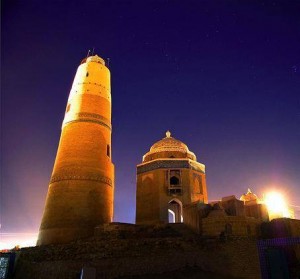Sights and Sounds of Pakistan: Sukkur-Last part
Wednesday, April 25th, 2012 1:00:14 by Naveed A Bari
Sights and Sounds of Pakistan: Sukkur-Last part
According to official census of 1998, Sukkur has a population of 908,370. Besides 96% Muslims, Sukkur also has relatively greater proportion of Hindus, mostly settled in urban areas and engaged in trade and services sector. Ethnically Sindhis share the biggest
segment of population (74%), followed by Muhajirs – refugees from India upon partition of British India (14%). Sukkur is also domicile of many Baloch tribes, including, Rindh, Chandio, Khoso and Laghari. Amongst others, there are Memon, Punjabi and Siraiki
sections.
Traditionally Memons were associated with trade and retail business but during last two decades they have ascended as an active social and economic front.
Sukkur is a hub of many small and large scale industries. Among important industries are cotton textiles, cement, leather, tobacco, paint and varnish, pharmaceuticals, agriculture implements, hand pumps, lock making, rice-husking, and sugar. Small-scale
cottage industries comprise hosiery, boat making, fishing accessories, thread ball spooling, trunk making brass-wares, cutlery and ceramics.
Being an agricultural city, crops like rice, maize, cotton, tomatoes, peas wheat, barley, gram and melons are sown here. Sukkur is famous world over, for its delicious dates. Sukkur also holds a large number of riverine forest on the course of Indus.
These tropical forests are found within the protective embankments on either side of Indus. During 1997-98 the total area under forests was 510 km² which yielded 55,000 cubic feet (1600 m³) of timber and 27000 cubic feet (760 m³) of firewood besides other
miner products.
Sukkur is a hub of many small and large scale industries. Among important industries are cotton textiles, cement, leather, tobacco, paint and varnish, pharmaceuticals, agriculture implements, hand pumps, lock making, rice-husking, and sugar. Small-scale
cottage industries comprise hosiery, boat making, fishing accessories, thread ball spooling, trunk making brass-wares, cutlery and ceramics.
Sukkur is also the narrowest point of the lower Indus. Hence it was here English made first barrage on the Indus in 1932. (Lloyd Barrage) 7 Canals were dig to distribute water in all parts of the province which eventually made Pakistan to have the longest
irrigation system of the world. With 38000 miles of irrigation canals known as Indus Food System.
Short URL: https://www.newspakistan.pk/?p=20227

















